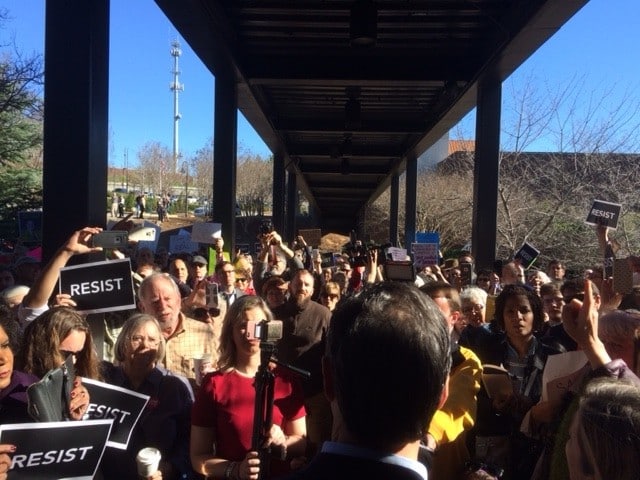Congressman Gary Palmer Holds Town Hall Despite Recent Protests
U.S. Rep. Gary Palmer fielded questions from constituents at a town hall in Hoover Saturday. Palmer’s visit follows a slew of contentious public meetings involving members of Congress and their constituents.
Residents flooded the entrance to Hoover City Hall waiting to meet with Palmer. Some members of Congress are refusing to hold town halls after several of their colleagues were met with angry and frustrated citizens. But Palmer chose to face the heat.
“I’m not afraid to meet with you,” Palmer told a small room of constituents. “I’m not afraid to hear from you. I’m not afraid to disagree with you.”
And that happened a lot.
People filled the seats of the chamber, and many more were forced to wait outside. Inside, people clutched signs: a green one that said “agree” and a red one that said “disagree.” The signs waved often, mostly red, as Palmer firmly stood his ground on sensitive issues.
“I support defunding Planned Parenthood … I do not support sanctuary cities … On the climate change thing, I agree there’s climate change, but I believe it’s through natural variation,” he said.
Palmer went on to say he doesn’t think humans have had an impact on climate change. He also said he believes charter schools are the answer to failing public schools. Many in attendance didn’t like what Palmer had to say.
Shea Rives of Bluff Park questioned Palmer’s willingness to stand up against what he called a dangerous and unqualified President Donald Trump.
“And I’ve heard you say in the past that we need more people willing to take a vote that may cost them the next election,” Rives said. “What I think we need today is more people willing to take a stand that might cost them the next election.”
The town hall lasted almost two hours, well beyond the one hour expected time limit. Many people left without being heard, but the meeting ended peacefully. Other Alabama representatives, like Republican U.S. Rep. Mo Brooks, are refusing to hold town halls, saying the meetings are potential threats to public safety.
Trump announces ‘major combat operations’ in Iran
Israel and the U.S. have launched strikes against Iran, with explosions reported in Tehran and air raid sirens sounding across Israel.
Trump says he is ‘not happy’ with the Iran nuclear talks but indicates he’ll give them more time
U.S. President Donald Trump said Friday he's "not happy" with the latest talks over Iran's nuclear program but indicated he would give negotiators more time to reach a deal to avert another war in the Middle East.
Bill Clinton says he ‘did nothing wrong’ with Epstein as he faced grilling over their relationship
Former President Bill Clinton told members of Congress on Friday that he "did nothing wrong" in his relationship with Jeffrey Epstein and saw no signs of Epstein's sexual abuse as he faced hours of grilling from lawmakers over his connections to the disgraced financier from more than two decades ago.
Pentagon puts Scouts ‘on notice’ over DEI and girl-centered policies
After threatening to sever ties with the organization formerly known as the Boy Scouts, Defense Secretary Hegseth announced a 6-month reprieve
President Trump bans Anthropic from use in government systems
Trump called the AI lab a "RADICAL LEFT, WOKE COMPANY" in a social media post. The Pentagon also ordered all military contractors to stop doing business with Anthropic.
HUD proposes time limits and work requirements for rental aid
The rule would allow housing agencies and landlords to impose such requirements "to encourage self-sufficiency." Critics say most who can work already do, but their wages are low.








